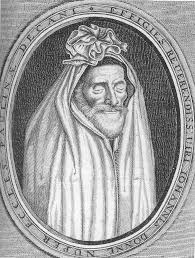Now I know with finals coming up we can all share a little bit of wanting that sweet, sweet, bliss of death if it will at least mean that we finally get more than three hours of sleep or so that we can skip that Ochem final, but John Donne really has us beat when it comes to wanting to die. This man led a tough life from the start. His father died when Donne was four and he lost two sisters and several other relatives. Of course it didn’t help that he was a Catholic, but even then this isn’t too much reason to die. He was even fine through his stint in university, attending both Oxford and Cambridge but failing to gain degrees from either because he refused to take the Oath of Supremacy. Even then, Donne pushed onward, suffering his brother’s death while attending law school. Then something sorta strange happened, he uprooted himself and traveled Europe for a little while, even fighting against the Spanish alongside Sir Walter Raleigh. People are pretty unsure of why he decided to do this, maybe to take a break from England Protestantism for a bit, but what’s important is what happens next.
Donne came b ack and fell in love with a lovely girl by the name of Anne More. Of course this is where his luck begins to change for the worse. He elopes with her, but is later arrested and thrown in jail along with his love. A minister marries them officially there but the father of the bride refuses to accept it and therefore refuses to hand over her dowry. While married he had many children and it is not with their life, but their death that Donne’s obsession was revealed. With his wife he had twelve children but just over half of them survived, driving Donne into an ever deepening despair, pondering suicide as the escape from his misery, “I flatter myself with this hope that I am dying too, for I cannot waste faster than by such griefs” -John Donne. It was in the throes of this despair that he wrote Biathanatos, his defense of suicide, almost an attempt to absolve himself of what he might do despite the strict Catholic teachings against it. Donne tried to support his view by claiming that Christ committed suicide by voluntarily going to the cross, and therefore in the effort of all Christians to be Christ-like, suicide is acceptable. Of course it must be worth noting that by this point his Catholic upbringing failed him completely and he made the switch to the Church of England.
ack and fell in love with a lovely girl by the name of Anne More. Of course this is where his luck begins to change for the worse. He elopes with her, but is later arrested and thrown in jail along with his love. A minister marries them officially there but the father of the bride refuses to accept it and therefore refuses to hand over her dowry. While married he had many children and it is not with their life, but their death that Donne’s obsession was revealed. With his wife he had twelve children but just over half of them survived, driving Donne into an ever deepening despair, pondering suicide as the escape from his misery, “I flatter myself with this hope that I am dying too, for I cannot waste faster than by such griefs” -John Donne. It was in the throes of this despair that he wrote Biathanatos, his defense of suicide, almost an attempt to absolve himself of what he might do despite the strict Catholic teachings against it. Donne tried to support his view by claiming that Christ committed suicide by voluntarily going to the cross, and therefore in the effort of all Christians to be Christ-like, suicide is acceptable. Of course it must be worth noting that by this point his Catholic upbringing failed him completely and he made the switch to the Church of England.
From here on Donne was consumed with death. He wrote many poems and other works, often having a running theme of dying and death spread among the more “normal” works. Mere weeks before he died, despite extreme illness he gave a sermon titled Death’d Duel, that in many ways reflected all of his ideas of death and dying intertwined closely with his faith. Even closer to death, convinced by a friend, Donne hired a portrait painter to paint him before death. Surprising everyone (which really shouldn’t have been a surprise at this point) he was ready for the painter with a shroud pulled tightly around him so that he could have a picture of what dead him would look like. It got even weirder when he then set that portrait by his bedside so he could look at it everyday and get excited that he would die soon.
So the moral of the story here is that no matter what sort of tests you got coming up you can’t beat John Donne’s crappy life, and even after his defense of suicide he still didn’t kill himself!
Resources:
https://en.wikipedia.org/wiki/John_Donne#Death
https://books.google.com/books?id=KLV2_nIzQMQC&pg=PA9&lpg=PA9&dq=john+Donne+death+wish&source=bl&ots=vWyURUThMu&sig=ENpZV6BxxtFDONdbHUnF8wqP2Z4&hl=en&sa=X&ved=0ahUKEwjxprD8wMrQAhUE6CYKHTewAzcQ6AEIIDAB#v=onepage&q&f=false
https://ethicsofsuicide.lib.utah.edu/selections/john-donne/

